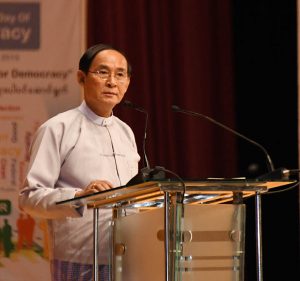16 September
President U Win Myint gave a speech at the International Democracy Day yesterday. The event took place at the Thabin Hall of the Pyidaungsu Hluttaw in Nay Pyi Taw. The following is the excerpt of the President's keynote speech at the event.
I would like to first of all extend my greetings and best wishes for the mental and physical well-being of all attendees, including the State Counsellor, Vice Presidents, Hluttaw Speakers, Union Ministers, Union-level officials, members of parliaments, ambassadors, UN organizations, representatives from political parties, teachers, students, local organizations and civil communities.
The objectives for celebration of International Democracy Day are to honour the sovereign states which are exercising democracy, to encourage democratic practices, to raise democratic awareness among the public, to continue democratic reforms and to enforce democratic foundations.
The Pyidaungsu Hluttaw has introduced a theme for International Democracy Day Participation. Democracy is for the people, by the people and the government of the people. Therefore, democracy centers on the people, and reflects public participation. Moreover, the 2008 State Constitution has recognized public participation in democracy.
World Guardian Principles such as righteousness, freedom and justice develop well in democratic states. Democracy is a founding system for peace, development, human rights and rule of law. As democracy is interrelated with human rights and rule of law, failure in one of these segments will lead to the loss of other components. Moreover, democracy aims for ensuring equity of conditions depending on the physical capacity, knowledge and endeavours of all the citizens regardless of gender. It also guarantees fair opportunities for all regardless of their wealth. It can also give opportunities for living in freedom and safety. Good governance or clean government will not come up without a democratic political system in a country. As people have realized this concept, they are always willing to enjoy democracy.
Myanmar is in the process of a democratic transition. It was learnt that the three steps in democratization process are liberalization, transition and consolidation. Myanmar people should make an assessment on the country's position in these steps. It is also required for all the people need to participate harmoniously in strengthening democracy in the country. People also need to realize that democracy in Myanmar is still at a fledgling stage.
In this regard, all the individuals and communities must abide by the existing laws, rules and regulations for the development of democracy. Democracy is a system of majority rule with respect for minority rights. In favour of stronger democratic practices, the differences should be solved through negotiations which require the basic foundations of tolerance, patience and forgiveness. A right solution could be found through a good mind and a fair opinion among every stakeholder. Absolute trust on democracy should be developed with national reconciliation by avoiding hate speeches and by overcoming loathing.
The government is striving for emergence of a democratic federal republic to retrieve democracy and federal rights. Democratic practices in Myanmar will help to ensure a federal system. Reciprocally, the practices of a federal system will strengthen democracy of the country.
Therefore, the fundamental democratic norms and federal principles could not be neglected. These principles could ensure fair rights and self-rule for the ethnic people, and help them live in unity.
Racial problems and disagreements are the major obstacles for the development of democracy in the countries without democracy or with fledgling democracy. Broader participation of the ethnic people is very important for effective democratization process through internal peace in developing a democratic federal republic. The norms for democracy and basic human rights should be enshrined in drawing, amending and adding some provisions in the State Constitution and laws. It is very important to filter out destructive acts during the process of democatization. Moreover, the practices that value democracy and human rights should be included in this process.
If all the people truly believe in democracy, they need to exercise democratic practices today, instead of in the future. In a democracy, the people are sovereign – they are the highest form of political authority. People's participation is the lifeblood of democracy, and it will foster democracy.
As democracy is concerned with the people, it must be implemented inclusively. The present time is a rare occasion for people as they are getting opportunities to take part in the democratization processes of Myanmar political history. The people of today are performing the remaining duties of the former generation who sacrificed their lives in successive eras in fighting for democracy. Democratization is a never-ending process, and it needs the continuous participation of the public.
I wish to urge all of you to work for the goal of democracy, establishment of a federal democratic republic, preventing authoritarianism and ensuring basic human rights. I conclude this speech by calling on the collective strength of the people who are the major driving force for democracy to strengthen basic principles of democracy which recognize that people are sovereign in a democracy. Thank you. (Translated by Aung Khin)



